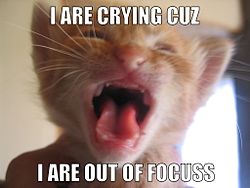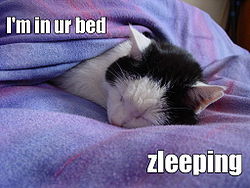Lolcat
A lolcat (pronounced /ˈlɒlkæt/ LOL-kat) is an image combining a photograph of a cat with text intended to contribute humour. The text is often idiosyncratic and grammatically incorrect, and its use in this way is known as "lolspeak" or "kitty pidgin".






"Lolcat" is a compound word of the acronymic abbreviation "LOL" and the word "cat".[1][2] A synonym for "lolcat" is cat macro, since the images are a type of image macro.[3] Lolcats are commonly designed for photo sharing imageboards and other Internet forums. Similar image macros which do not actually feature cats are often simply referred to as "lols".[4]
History
editAs early as the 1870s, British portrait photographer Harry Pointer created a carte de visite series featuring felines posed in various situations, to which he added amusing text intended to further enhance their appeal.[5]
However, the first recorded use of the term "lolcat" is from the anonymous imageboard, 4chan.[6][7][8] The word "Lolcat" is attested as early as June 2006, and the domain name "LOLcats.com" was registered on June 14, 2006.[9] Their popularity was spread through usage on forums such as Something Awful.[10] The News Journal states that "some trace the lolcats back to the site 4chan, which features bizarre cat pictures on Saturdays, or 'Caturdays'." Ikenburg adds that the images have been "slinking around the Internet for years under various labels, but they did not become a sensation until early 2007 with the advent of I Can Has Cheezburger?"[11] The first image on "I CAN HAZ CHEEZBURGER?" was posted on January 11, 2007, and was allegedly from the Something Awful website."[12][13] Lev Grossman of Time wrote that the oldest known example "probably dates to 2006,"[14] but later corrected himself in a blog post[15] where he recapitulated the anecdotal evidence readers had sent him, placing the origin of "Caturday" and many of the images now known by a few as "lolcats" in early 2005. The domain name "caturday.com" was registered on April 30, 2005.
The term lolcat gained national media attention in the United States when it was covered by Time,[16] which wrote that non-commercialized phenomena of the sort are increasingly rare, stating that lolcats have "a distinctly old-school, early 1990s, Usenet feel to [them]".
Entertainment Weekly put them on its end-of-the-decade, "best-of" list, saying, "Da cutest distractshun of da decaid? Y, lolcats of corse! We can neber haz enuf of deez capshioned pics of cuddlie kittehs."[17] 'Lolcat' was also a runner-up under the "Most Creative" category under the American Dialect Society Word of the Year Awards, losing out to 'Googlegänger'.[18]
Format
editLolcat is a composite of two words, "lol" and "cat". "Lol" stands for "Laugh out Loud" or "Laughing out Loud", hence lolcats are intended to be funny and to include jokes.[19] The lolcats images usually consist of a photo of a cat with a large caption characteristically set in a sans serif font such as Impact or Arial Black.[20] The image is, on occasion, digitally edited for effect. The caption generally acts as a speech balloon encompassing a comment from the cat, or as a description of the depicted scene. The caption is intentionally written with deviations from standard English spelling and grammar,[20] featuring "strangely-conjugated verbs, but a tendency to converge to a new set of rules in spelling and grammar".[20][21][22][not in citation given] The text parodies the grammar-poor patois stereotypically attributed to Internet slang. Frequently, lolcat captions take the form of phrasal templates.[22] Some phrases have a known source, usually a well-known Internet meme, such as All your base are belong to us or Do not want,[23] while others don't. The language of lolcats has also been likened to baby talk.[24]
Common themes include jokes of the form "Im in ur noun, verb-ing ur related noun."[25] Many lolcat images capture cats performing characteristically human actions or appearing to use modern technology, such as computers.
There are several well-known lolcat images and single-word captions that have spawned many variations and imitations, including "Ceiling Cat" (see below). Others include Fail (a cat with a slice of processed cheese on its face)[26] and "I Can Has Cheezburger" (a portrait of a blue British Shorthair).[27]
Offshoots and parodies
editVariations on the lolcat concept include captioning photos of other animals in a similar style (e.g. loldogs for dogs, etc.).
The syntax of lolcat captions was used as the basis for LOLCODE, an esoteric programming language with interpreters and compilers available in .NET Framework, Perl, etc.[1]
Ceiling Cat and Basement Cat
edit"Ceiling Cat" is a character spawned by the meme. The original image was an image macro with a picture of a cat looking out of a hole in a ceiling, captioned "Ceiling Cat is watching you masturbate." [28] There followed numerous image macros with the format "Ceiling Cat is watching you [verb ending in/rhyming with -ate]" with Ceiling Cat superimposed in the upper left hand corner of an image macro depicting the appropriate action. The character is also featured in a project to translate the Bible to lolspeak. "Ceiling Cat" and the corresponding "Basement Cat" (a black cat who lives in the basement) represent good and evil (sometimes God and Satan) in the lolcat universe.[29][30][31]
See also
edit- Cats That Look Like Hitler - a type of LOLcat specifically made to look like Hitler
- Image macro
- Internet meme
- Laugh-Out-Loud Cats - a comic inspired by lolspeak and other Internet humor
- List of Internet phenomena
- LOLCat Bible Translation Project
- LOLCODE - an esoteric programming language inspired by lolspeak
- O RLY? - a related meme featuring image macros
- Oolong (rabbit) - A bunny trained to balance objects on its head. Famous for balancing pancakes and waffles, it has become a meme similar to Lolcats.
- Padonki - a Russian Internet subculture with slang similar in format to lolspeak
Notes
edit- ^ a b Lua error in Module:Citation/CS1/Configuration at line 2058: attempt to index a boolean value.
- ^ Lua error in Module:Citation/CS1/Configuration at line 2058: attempt to index a boolean value.
- ^ Lua error in Module:Citation/CS1/Configuration at line 2058: attempt to index a boolean value.
- ^ "LOL builder: Make your own lols"
- ^ "Harry Pointer's Brighton Cats"
- ^ Lua error in Module:Citation/CS1/Configuration at line 2058: attempt to index a boolean value.
- ^ Lua error in Module:Citation/CS1/Configuration at line 2058: attempt to index a boolean value.
- ^ Lua error in Module:Citation/CS1/Configuration at line 2058: attempt to index a boolean value.
- ^ WHOIS domain registration information results for lolcats.com from Network Solutions
- ^ Lua error in Module:Citation/CS1/Configuration at line 2058: attempt to index a boolean value.
- ^ "Lolcats' demented captions create a new Web language," Tamara Ikenberg, The News Journal, July 9, 2007
- ^ About « Lolcats ‘n’ Funny Pictures - I Can Has Cheezburger?
- ^ "Original Picture, cheezburger, ICANHASCHEEZBURGER, September 26, 2007 icanhascheezburger.com
- ^ Lua error in Module:Citation/CS1/Configuration at line 2058: attempt to index a boolean value.
- ^ Lua error in Module:Citation/CS1/Configuration at line 2058: attempt to index a boolean value.
- ^ Lua error in Module:Citation/CS1/Configuration at line 2058: attempt to index a boolean value. Partial scan of the print edition: fcrunk.wellimean.com
- ^ Geier, Thom, et al. (December 11, 2009). "The 100 Greatest Movies, TV shows, Albums, Books, Characters, Scenes, Episodes, Songs, Dresses, Music Videos, and Trends that entertained us over the past 10 Yuears". Entertainment Weekly. (1079/1080):74-84
- ^ Americandialect.org
- ^ Lua error in Module:Citation/CS1/Configuration at line 2058: attempt to index a boolean value.
- ^ a b c Lua error in Module:Citation/CS1/Configuration at line 2058: attempt to index a boolean value.
- ^ Lua error in Module:Citation/CS1/Configuration at line 2058: attempt to index a boolean value.
- ^ a b Lua error in Module:Citation/CS1/Configuration at line 2058: attempt to index a boolean value.
- ^ Lua error in Module:Citation/CS1/Configuration at line 2058: attempt to index a boolean value.
- ^ Lua error in Module:Citation/CS1/Configuration at line 2058: attempt to index a boolean value.
- ^ Lua error in Module:Citation/CS1/Configuration at line 2058: attempt to index a boolean value.
- ^ Microtrends: Failure - Times Online
- ^ Lua error in Module:Citation/CS1/Configuration at line 2058: attempt to index a boolean value.
- ^ Lua error in Module:Citation/CS1/Configuration at line 2058: attempt to index a boolean value.
- ^ Lua error in Module:Citation/CS1/Configuration at line 2058: attempt to index a boolean value.
- ^ Lua error in Module:Citation/CS1/Configuration at line 2058: attempt to index a boolean value.
- ^ Lua error in Module:Citation/CS1/Configuration at line 2058: attempt to index a boolean value.
References
edit
- With 'LOLcats' Internet Fad, Anyone Can Get In on the Joke, Wall Street Journal, 25 August 2007
- If you give a cat a keyboard, Minneapolis Star Tribune, 26 July 2007
- Bloggers Bring in the Big Bucks, BusinessWeek, 13 July 2007
- Oh Hai! Cats, the internet, and tactical communities., Joshua Green in receiver magazine, Autumn 2007
- Lua error in Module:Citation/CS1/Configuration at line 2058: attempt to index a boolean value.
External links
editTemplate:Side box Template:Side box
- REDIRECT Template:Internet dialects